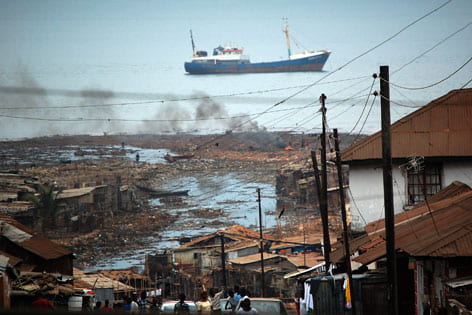Cleaning up the ‘blood diamond’ business
Richard Matthew works in Africa to curb violence, abuses linked to diamond trade.

Before a diamond ends up in a ring or pendant, it may have played a part in a cycle of violence and corruption on the other side of the world.
Richard Matthew, UC Irvine planning, policy & design associate professor, studies the complex social and environmental factors that have led to the proliferation of “blood diamonds” in Rwanda, Sierra Leone and the Democratic Republic of the Congo.
Rebel forces in these areas use diamonds to finance their violent opposition to the government. The fight for access to and control of these valuable and scarce natural resources has resulted in numerous civilian casualties. Once blood diamonds enter the marketplace, it is very difficult to trace their origins.
Matthew, UCI Center for Unconventional Security Affairs director, works with the United Nations in Africa as a senior expert on environment and conflict. Below, Matthew discusses how the diamond industry is not yet free of corruption and exploitation, despite international attempts to clean it up.
Q: What role does corruption play in the diamond industry?
A: In places such as Sierra Leone, thousands of people sift through vast expanses of terrain collecting diamonds. These diamonds pass through many hands between the artisanal miner who finds the rough stone and the consumer who buys the cut-and-polished pendant or ring. Several points in this chain remain vulnerable to exploitation. The opportunities for corruption are amplified by the global financial crisis, the discovery of large diamond deposits in Northern Canada, and the sheer number of diamonds already owned by consumers, which reduces demand and prices. Under stressful conditions, people who work on their own and whose livelihoods depend on finding a couple of diamonds a year can more easily be lured or coerced into the unregulated side of the industry. If supply remains high and prices do not recover, we may see the industry change in significant ways as labor needs dwindle and small operations become less viable. This will be a blow to diamond-based economies. Unfortunately, economic shocks to fragile countries can kindle conflict.
Q: Describe your efforts to address corruption in Africa’s diamond industry.
A: My work is in a very preliminary phase. To address abuse and exploitation, we first must bring greater transparency to the diamond business in regions where there are major problems. Until people monitoring the trade can see how contracts are awarded, review environmental impact assessments and have access to accurate information about revenue flow, the business will be tainted by suspicion and misperception and vulnerable to corruption. Second, we aim to reduce the amount of discretion that government officials have in awarding licenses and contracts and that intermediaries have in purchasing gems from artisanal miners. Third, we want to find ways to protect these miners from being cheated or coerced by establishing a regulated and open market for rough stones. With larger operations, it is important to ensure that contracts are fair. They need to appreciate the legitimate needs and concerns of investors while providing a reasonable revenue stream to the government and tangible benefits – employment, training and infrastructure – to the community. Finally, we want to increase environmental awareness, as mining affects land use and water flow.
Q: What can consumers do to keep blood diamonds off the market?
A: How can you be sure that the old map you buy on eBay was not stolen from a university library or that the meat in your hamburger was adequately inspected? The speed and scale of economic globalization is, in many ways, disorienting for the consumer who wants to make ethical investments and purchases. At the same time, we have unprecedented access to information, and anyone can do a little research before purchasing something like a diamond. The Conflict-Free Diamond Council is a good place to start, as are groups such as Global Witness.
Q: Why should problems in Africa concern people in the U.S.?
A: Africa is huge, with many diverse countries and dependencies, so it is important not to generalize. We have long ties with parts of Africa, such as Liberia and Sierra Leone, both of which received large numbers of freed American slaves in the 18th and 19th centuries. In Africa, there are regions we need to worry about as incubators of terrorism, piracy and other threats. There also are areas that confront us with humanitarian challenges. Some parts of Africa have important mineral and other resources that we depend on in such sectors as information technology. There is much economic vitality and promise throughout Africa that we ought to engage. Like it or not, what we do in the U.S. – our investments, our resource consumption, the governments we support and the waste we generate – affects life in Africa. We have the ability to help make things better or worse. We can’t pretend that what we do does not matter, nor can we avoid being affected if things get worse and people are displaced and turn to criminal activity or extremism.
Q: What are the next steps in your research?
A: I will make more field trips to conflict and post-conflict zones in Rwanda, the DRC and Sierra Leone. I’m working on a book that tries to bring this research together in a compelling way. In addition, I have been asked to write a book on the science and social science of climate change that would make this very complex research field accessible to everyone. I think this is just the sort of thing a professor of social ecology ought to be willing to take on.